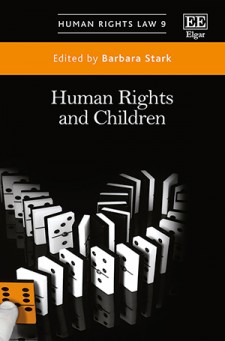The notion of an international law blog by women seemed innovative and, somehow, just right when I first heard about the
birth of IntLawGrrls almost a year ago. Once I finally decided to enter the fray, naming and claiming an international “foremother” also sounded inspiring and fun.
Still, actually choosing such a woman – I wanted to honor the legacy of Black women in international affairs – turned out to be much more challenging than I thought. Not that Black women’s participation in international law, foreign policy, or cross-cultural relations is anything new. But all too often their contributions are invisible in the media or subsequent historical narratives, marginalized or overshadowed by the work of more famous male and/or non-Bla

ck relatives or colleagues, or even undermined as distracting or intrusive of mainstream or radical agendas.
No historian, I searched my own limited memory and experience; various intriguing options presented themselves:
► “
Nanny” (?-c.1733), legendary Jamaican-Maroon who led resistance to British incursions into Maroon territory), as Kimberly J. Brown discusses
here. Nanny of the Windward Maroons is the transnational
foremother of
Karen E. Bravo, another of us IntLawGrrls.
►
Sojourner Truth (1797-November 26, 1883), African-American abolitionist, feminist, orator, and preacher.
►
Harriet Tubman (c.1820-March 10, 1913), conductor of the Underground Railroad, who helped hundreds of African-Americans escape slavery to free states in the U.S. and Canada; Union-side Civil War scout, spy, and nurse.
►
Mary McLeod Bethune (July 10, 1875-May 18, 1955), African-American educator, founder of the National Council of Negro Women; consultant on interracial affairs at the founding conference of the United Nations in 1945.
►
Zora Neale Hurston (January 7, 1891-January 28, 1960), novelist, poet, anthropologist of Black cultures in the southern United States, Haiti, and Jamaica.
►
Shirley Graham DuBois (November 11, 1907-March 1977), African-American novelist, historian, and political activist; lived as an expatriate in Ghana and Egypt.
►
Angela E.V. King (August 28, 1938-February 5, 2007), leading African-Jamaican diplomat and advocate for girls and women; UN Assistant Secretary-General; head of the UN Division for the Advancement of Women.
Because of such women, there are today so many living influential Black women “IntLawGrrls” that they cannot be listed on a single page (and yet, they are still far too few).
Then it hit me. All of my previous work has been dedicated to my mother and my grandmother (middle name Louise), each cross-cultural travelers of a sort. (See, e.g., my 1997 article
Lionheart Gals Facing the Dragon.)
And, like many others of Afro-Caribbean descent, I grew up admiring “Miss Lou,” the stage name of revered African-Jamaican poet/singer, political satirist, and social critic
Louise Bennett-Coverley (above right). My grandmother (1902-2005) was also called “Miss Lou” perhaps not coincidentally, since she also loved to perform long dramatic poems for public gatherings.
As detailed
here, The Honorable Louise Bennett-Coverley (“Miss Lou”) was born in Jamaica on September 7, 1919 and passed away on July 26, 2006. Educated under the British colonial system, Mrs. Bennett-Coverley became known for documenting and valuing indigenous and syncretic African-Jamaican cultural norms and vernacular through poetry and storytelling. A humorist, she dramatized and poked fun at everyday life among grassroots people, as well as at the pretensions of politicians and British high society. Her social commentary burned in the memory and hit hard, but also left people roaring with laughter.
The Jamaican government and people formally recognized her as Ambassador at Large and granted her the country’s highest honors (the Order of Jamaica and Member of the Order of Merit) for her contributions to the reclamation and enhancement of Jamaican culture.
The international connection? Miss Lou was a walking, talking course in post-colonial globalization. Some of Bennett-Coverley’s poetry captured the contradictions of colonial and post-colonial migration perfectly – the yearnings for socio-economic opportunity promised in the racially charged colonial metropole; the desire to adopt superficially the styles and customs of the colonizer; and the struggle between rejecting home country culture and language as “backward” and the need to hold on to it as a sign of cultural integrity and pride.
Written in response to a large British-government encouraged migration from Jamaica to England during post-World War II labor shortages, her poem “
Colonization in Reverse,” excerpted below, still resonates today. It spoofs the headlong rush to find fortune in “the Mother-land,” but also subtly reveals the political, economic, and cultural resistance and subversion that migration itself could represent. The former British colonizers themselves now feared “invasion” by Afro-Caribbean peoples.
The Creole
patois spelling is retained below as used in 1966. (Reggae artist Bob Marley is said to have credited Miss Lou’s example with providing the basis for his own use of Jamaican dialect over the objections of early record distributors that it would damage international sales). (See
Times of London obituary of Louise Bennett Coverley.)
Colonization in Reverse (1966), by Louise Bennett
Wat a joyful news, Miss Mattie,
I feel like me heart gwine burs
Jamaica people colonizin
Englan in reverse.By de hundred, by de tousan
From country and from town,
By de ship-load, by de plane-load
Jamaica is Englan boun.
. . . .
What a islan! What a people!
Man an woman, old an young
Jus a pack dem bag an baggage
An tun history upside dun!My blog posts will be dedicated to the women named above, and especially to Miss Lou, for her ability to affirm culture and criticize injustice with humor and insight, and for her hope that all of us could turn history upside down.




 We’re proud to announce that
We’re proud to announce that 




 This Friday, February 27, from 12pm to 1pm ET, the American Society of International Law New Professionals and International Criminal Law Interest Groups present a webinar featuring speakers from the international courts and tribunals in The Hague and other organizations engaged in international criminal law. “
This Friday, February 27, from 12pm to 1pm ET, the American Society of International Law New Professionals and International Criminal Law Interest Groups present a webinar featuring speakers from the international courts and tribunals in The Hague and other organizations engaged in international criminal law. “ The event will be moderated by IntLawGrrl
The event will be moderated by IntLawGrrl 
 Dr.
Dr.  Dina Haynes
Dina Haynes